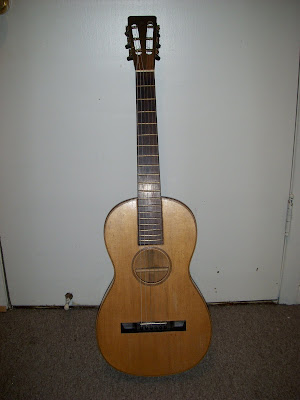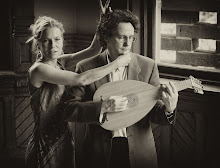
For us the guitar is a marker of direct, honest communication and non-elitist, even working class usage. 'I'll get out my guitar and play/just like yesterday/and get down on my knees and pray/we don't get fooled again.' wrote Pete Townshend. Even if the prosody worked, if he had written 'I'll sit down at my piano and play…' the meaning would have been different. For the aspiring and wealthy American of the mid-19th century however, the guitar had not yet acquired the meaning we attach to it. For them the guitar was associated with the classical guitarists of the European capitals of culture: Giuliani, Sor and Carulli. The guitar for them was a marker of civility and gentility and they demonstrated to themselves that they were just as cultured as those in the European capitals by consuming arrangements of art music and opera composed in those cities. But the burgeoning bourgeois culture of the antebellum United States was the one that left us the ballads of Stephen Foster, and unsurprisingly, some of the opera arias we present are adapted to that taste: compare the arrangement of the Barcarolle from Hérold's opera Marie (Batelier dit Lisette) to the sentimental Irish ballad Sweet Jessie was Young and Simple. There must have been a market for more bravura performances, though; who would have thought the aria Ah, non giunge from Bellini's La Sonnambula (in its English translation Ah, Don't Mingle) would have been suitable for performance in the parlor with the diminutive parlor guitar replacing the orchestra? The aria was arranged for every medium, including piano, violin and slightly later, classical banjo (sic).
P.T. Barnum (his famous circus has web presence now) brought one of Europe's most famous singers to North America in 1850. With the soprano Jenny Lind and the violinist Ole Bull, Barnum became a cultural tycoon as well as all the other kinds. Lind's success (she even performed at Toronto's St. Lawrence Hall) meant that the tag 'from the repertoire of Jenny Lind' ensured additional sales. Repertoire celebrating her was often arranged for and with guitar for those with aspirations to high culture, but without yet the means to acquire that most bourgeois of instruments, the piano.
The guitar's presence in Latin American music will be less surprising to us. Afro Latin rhythms first moved into the high art repertoire via the theatre. Many Spanish and Portuguese plays featured a stock black character, often a guitar player and often a figure of fun. One such character is told to give up his seat for a white man, but minutes later, after a performance of guitar music, gets his seat back so as to honour to the 'black orpheus.' Native Americans, too had an influence on this repertoire, participating in music making in church and vice-royal courts.
Latin American music was soon being exported back to Europe, as we hear in the songs printed in the Colleccion General and to North America with guitarists such as Delores Nevares de Goni, who taught in New York, toured both North and South America and was famous enough to have had a model of guitar named after her by C.F. Martin and Co. by the 1840s.
And where was Canada in all this? Unfortunately, we have not been able to discover what was being sung to the guitars which Martin shipped into Canada in the mid-1800s. Accomplished players left the country for the US in the last years of that century one becoming instructor of guitar at the illustrious Boston Conservatory. The National Library of Canada lists one single guitar song sheet published in Toronto and that lies in the British Library. More research needs to be done to find out whether our own parlours were as guitar friendly as those of our American cousins.
Batelier dit Lisette
Boatman, said Lisette, I wish to cross the water,
But I am too poor to pay for the boat.
Colin said to the beauty, come, come always.
And sail the vessel that bears my love.
I am going to my father, said Lisette to Colin
Well, do you think, my dear, he will grant me your hand?
Ah! replied the beauty, never stop trying.
And sail the vessel that bears my love.
After his marriage, always in his boat,
Colin was the wisest of the husbands in the hamlet;
He always repeated his faithful song,
"And sail the vessel that bears my love."
Ganinha, minha Ganinha
Ganinha my Ganinha
Ganinha my Lady
Ay la la, my heart,
To love is not worth it.
Se fores ao fim do mundo
If you go to the end of the world
I will have to go there to fetch you
Where ever you are
I cannot be without you
Por desabafar saudedes
To relieve the longing
That my heart suffers
When night falls to the mortals
I begin to sigh.
Os me deixas que tu das
The cold shoulders you give
When people touch you are so cute
I've never seen such in other girls
How I like, little lady, to tease you
When I see that you are angry with me
You get so agitated -
That satisfies me no end
And if I tell you to go
I once again imprison you
It is only to see
the cold shoulder that you give.
Homens errados e loucos
Wrong and crazy men
In what love you wrap yourself.
Of the enjoyable freedom
You remember very little.
Freedom, nothing more.
El Consejo
The Advice
Mistaken is she who brags of defeating her affection,
Because blind and cowardly Love never listens to reason.
And thus, pretty girls, flee the occasion because the little Cupid is always a traitor,
Showing his inhumane, hidden tyranny and if we search for him he distances himself quickly.
Don't trust who tells you I want your heart, since sometimes the tales are weapons that win with treason.
And thus...
Being cautious is what matters in early passion,
Since the whole world is lies, tricks and seductions.
And thus...
Pan de Jarabe
The Syrup Bread
I was your first love and now you don't let yourself be seen.
That this happens in the world to her who knows how to love.
Within your sight, my lord, I was joyful, I was happy,
But absent from your side, I didn't want to live any more.
The memory your image of calms, in part, my pain,
And the tender vows make me thankful for the illusion.
El Vejuquito
This new little tune of Veracruz has come
And it is brought by a little black girl,
Who sings it beautifully, Tai rai etc.
Behold it yourself, how nice it is. Tai rai rai etc.
They call it the Vejuquito,
And with this softness, numbs the senses.
A little Indian girl in her garden was picking flowers
And a little Indian boy was watching her and sings his love.
Tai rai rai etc.
A little Indian boy was telling her tenderly of his discomfort
“For your life, Soapile, dance for me the totaconiche.”
Tai rai etc.


